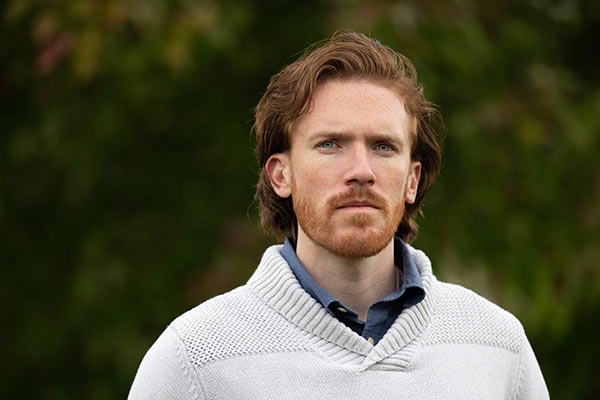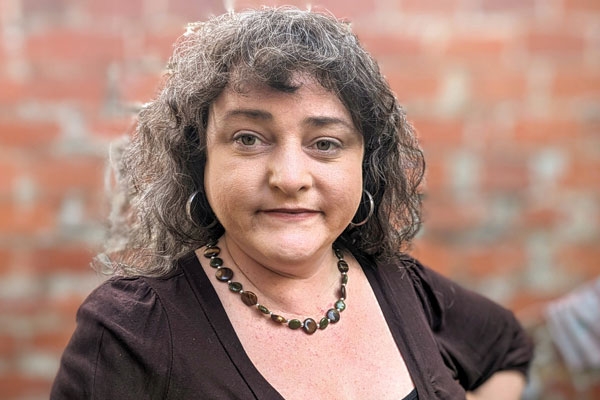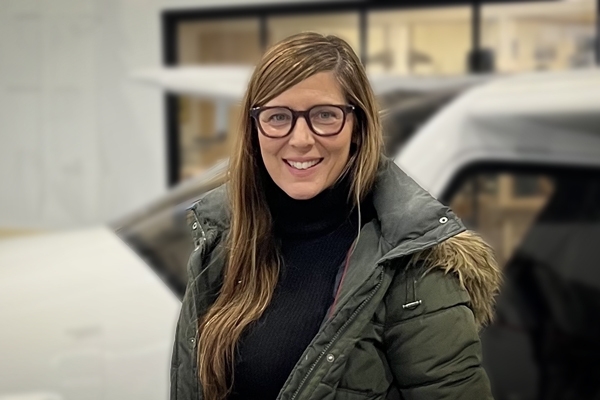Kathryn Phelan has always had a penchant for editing.
Electing to take nonfiction writing classes while working toward an international relations degree at Grand Valley State University, Kathryn started to gain experience that would later solidify as a career as an editor.
She recalls, “I remember one day asking my professor a very specific question about punctuation, and he said, ‘Let your editor worry about it.’ I asked, ‘What if I’m the editor?’”
That instinct made Kathryn wonder whether editing was her true calling. The same professor referred her to work as a writing consultant at the Fred Meijer Center for Writing & Michigan Authors, where she underwent intensive editing training in order to hold one-on-one consultations with students and help in classrooms on campus.
“The writing center was incredible—it was really a paragon of professionalism, organization and peer support,” Kathryn recalls. “It was difficult to ignore how much I loved the work.”
Before going on to earn a Master’s in Philosophy in Creative Writing at Trinity College, Dublin, Kathryn spent time teaching English in Brazil:
“I was working in a college registrar’s office, and a group of students were going to teach EFL in Salvador for a month. At the last minute, one of the team members dropped out. So they were short a participant and casting around for someone to replace him. I had some basic knowledge of Portuguese and—probably more importantly—a reputation as being up for adventure. Flying to Brazil without much notice or training was right up my alley.
“The kids were spirited, indefatigable and very keen to get English grammar right, in all its inexplicable glory. They had clever and in-depth questions that tested the limits of my grammatical knowledge. Have you ever needed to define ‘even’ as an adverb, as in, ‘I don’t even know’? It took a while.
“Now, years later, they message me in fluent, idiomatic English. It makes me so happy. I went back to Brazil a couple years later as a leader for the same program. It was a different experience, but the constant is that the kids are just magic.”
The certificate has been a chance to learn and build context around my own experience by talking to the instructor and comparing notes with classmates from other fields and backgrounds.
Editing Around the World
Upon completing her postgraduate degree, Kathryn took an editorial internship at The Lilliput Press in Dublin and then dove head first into a freelance editing and writing career. Her clients come from all over the world and have included Forbes magazine, The Hedge Fund Journal and even one of her writing professors, whose book—Finding Abbey: The Search for Edward Abbey and His Hidden Desert Grave—won the 2015 National Outdoor Book Award. In keeping with her background in international relations, Kathryn also worked as an English editor in Montenegro.
“Many of the projects are short-term, so it can be a hustle,” Kathryn says. “But I love becoming totally immersed in a topic for a period of weeks or months and then jumping off to the next thing.”
With these years of experience under her belt, Kathryn was looking for a way to formalize her training. So where better to turn to than our Professional Sequence in Editing?
“My editing training had been comprehensive but not cohesive,” Kathryn explains. “The immediate draw of the certificate was the standard qualification. But more than that, it’s been a chance to learn and build context around my own experience by talking to the instructor and comparing notes with classmates from other fields and backgrounds. It’s also remarkably valuable to have your own editing edited. I’ve appreciated the opportunity for that kind of focused and in-depth feedback.”
It’s been gratifying to be able to explain complex grammatical rules with more precise terminology—which could be useful scaffolding for designing an English or EFL curriculum in the future, or arguing the finer points in a line edit.
Building Her Skills
Kathryn is halfway through the program’s curriculum and is looking forward to jumping into the last two classes—spurred on by being a 2020 Impact Scholarship winner!
“This scholarship allows me to focus more on the coursework and avoid the burnout of a work/study overlap,” Kathryn says. “It can be a bit dispiriting to spend several hours correcting grammar in order to afford several hours of studying grammar. Having some of that pressure off feels like a deep breath. I’m grateful for opportunities like this and the people who make them possible.”
As she reflects on her two completed classes—Grammar, Mechanics and Usage for Editors and Editorial Workshop I: Introduction to Copyediting—Kathryn is happy to say that the practical tools she’s learned are already finding their way into the editorial projects that come across her desk.
“It’s been gratifying to be able to explain complex grammatical rules with more precise terminology—which could be useful scaffolding for designing an English or EFL curriculum in the future, or arguing the finer points in a line edit,” Kathryn says.
“The most notable development for me is establishing clearer delineations between levels of editing and sticking to them.”
Speaking this strange dialect of editing—and having people respond with enthusiasm—has instantly created a little community.
Lively Discussions All Around
For many of our students taking classes during the COVID-19 pandemic, finding avenues to connect with instructors and fellow classmates has been more important than ever. Especially in the online learning environment, establishing a sense of community adds depth to the dialogue around course content. In the case of editors, well, there are sure to be lively discussions about the rules—and whether they can be broken.
“It’s been wonderful to connect with humans who have willingly elected to study the intricacies of English grammar,” Kathryn says. “Speaking this strange dialect of editing—and having people respond with enthusiasm—has instantly created a little community. The instructor has been understanding of all of us coming from different backgrounds and having different, real-life priorities that might interfere with our ability to study. The flexibility and communication have made the experience more relaxed and enjoyable.
“Class discussions have been engaging and lively, and I love how people post articles about all sorts of relevant topics—moving beyond what strictly qualified as coursework into areas of genuine curiosity and interest.”
One interesting conversation that has made its rounds during a recent class? Inclusivity in the way we write and edit, including updates to pronoun conventions.
“Grammar rules are not known for their swift adaptability, so it’s been exciting to learn about how quickly those changes are being implemented and accepted,” Kathryn says.
Each discussion, each new skill learned, each new insight into a grammar rule—Kathryn parlays all of this into her work, whether that’s proofreading a textbook, copywriting for an Irish charity or completing a manuscript critique as part of her contracting work for Scribendi, a Canadian editing company.
“I find balancing projects and timelines really fun—it keeps me energized. Also reliant on coffee.”
Removing her student hat and putting on her mentor hat, she has this to offer students considering the Editing program:
“Try to find the implausible pleasure in understanding the rules of English grammar to this degree of depth and accuracy. It’s vertiginous, but it does get easier. I’d also recommend asking loads of questions. Everyone has been so patient and kind, and several of my classmates’ tips and hacks have stuck with me.”



